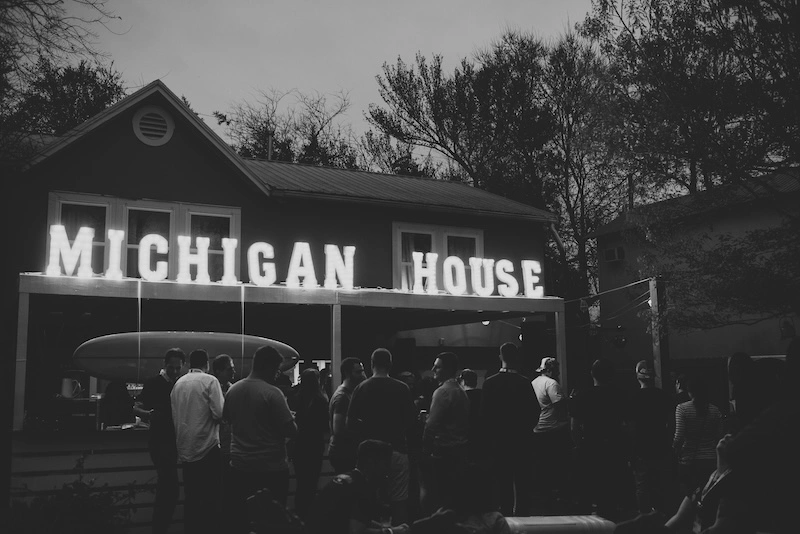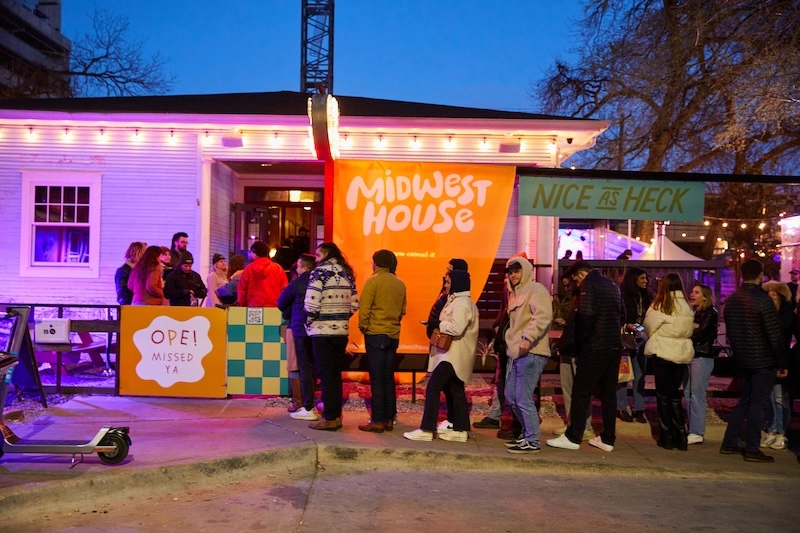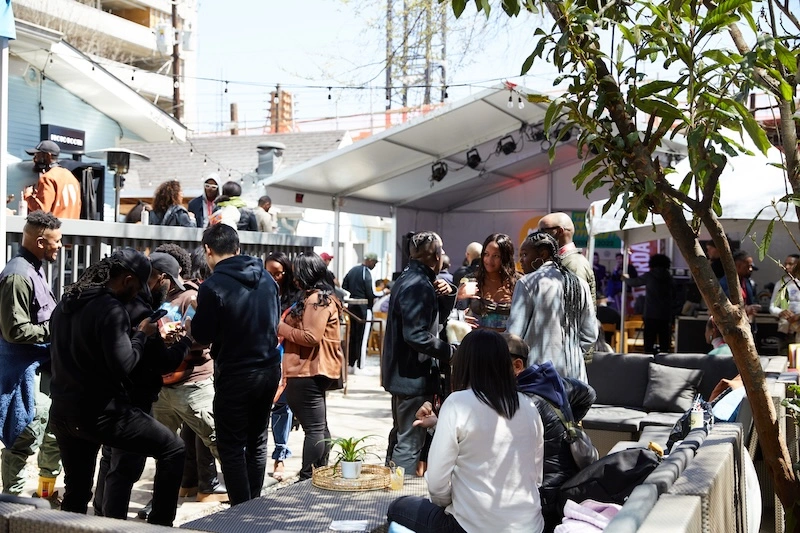
Become a member & keep reading for free, or choose a paid membership.
Access all our content & email newsletter

This is the first in a two-part series on the history of Midwest House the second of which will be published on Thursday, October 16th. It is part of StartMidwest’s ‘Homecoming Week’: presented by the Midwest House Summit, taking place December 3-4 this year in Grand Rapids, Michigan. Get your tickets here and use the term "OPE2025" to get 10% off.
On a cool March night back in 2015, a rented house in East Austin, Texas, was pulsing with energy. Inside: a penny pony from a Meijer grocery story by the door, an ice-cream cart parked like a prop from a summer back home, and a band from Michigan named after a NASCAR legend crammed against a wall of mismatched amps, playing a one-off show for a crowd that had lined the block to get in. The whole thing was audacious, stitched together on hustle and favors “basically a four-day house party,” Ted Velie laughs now… and it worked.
For people who’d travelled from Michigan, Ohio, Indiana, Chicago, and beyond, the iterations of that house have become a compass point in the chaos of SXSW: a place to return to, to catch up, to plug in, to be seen and to see who else was there.
Midwest House was known as Michigan House back then and represented a feeling more than anything else, amongst the springtime festival in Texas. They even had t-shirts with “Hard earned style” emblazoned across them. It was a wink, but also a thesis: there's beauty in the things we’ve built and rebuilt, in the patina of making do, in the culture that grows between factory shifts and lake sunsets. That phrase had started as the tagline of Ted’s scrappy furniture line - tables built out of the afterlife of industry - before it became a banner for a new kind of gathering.
The story behind that ‘house party’ starts, as these stories often do in the Midwest, in a place that doesn’t shout about itself as the center of anything. In 2011, Ted had gone home to Michigan for a summer, with every intention of heading back to teaching English in New York City. The economy still wasn’t great in the years after the credit crunch, and his dad asked for help in his manufacturing business while Ted was back home. He stepped in to help,’ just while I’m here’, he thought. But something shifted. “Being back home felt good. Felt great,” he says. “I was spending a bunch of time in Lake Michigan… and being like, ‘Okay, I’m not going back.’”
“There’s a… saying… ‘write a word, a sentence, write a tree.’ And I think… what I do now is like writing a tree because… you just kind of plant it and then it grows.”
A writer who builds rooms
Long before the house party, before sponsorship decks and speaker contracts, Ted wanted to be a writer. He has an MFA in creative writing from the University of Colorado, taught undergrads how to shape sentences, and devoured novels in between checking IDs as security at Conor O’Neill’s in Ann Arbor. How does a state-championship winning football player, who reads novels while working security at a bar and works as an English teacher… then turn all that into running one of the most well-known events businesses in the Midwest? “What I do now is interesting… you can kind of set things up and then like see where they go,” he explains. “There’s a… saying… ‘write a word, a sentence, write a tree.’ And I think… what I do now is like writing a tree because… you just kind of plant it and then it grows.” The novelist’s trick to compose a scene, put the right characters in it, and let them collide became a strategy for building events.
He’d always had a streak for stagecraft. As a kid, he ran a casino for his mother’s book club: Monopoly money, “different… games of chance,” even frog racing. Entrepreneurship as play, community as the point. The theater of making something social out of thin air seemed to have stuck.

Back in Michigan, after helping out his dad for a while Ted experimented with turning this skill in creating social spaces for people into something more tangible, including a pop-up shop called Middle West. It took place during Grand Rapids’ ArtPrize and was packed for three days straight, proof that “people were way into” a fresh expression of what the region made. Part of the lesson from that pop-up was that siloes existed across the state and within the Midwest. One brand, Detroit Denim, told him “‘It's so funny… we're sold in like 34 different states, but we've never had any product west of Lansing’ ... you started realizing there was this real divide in the state between east side and west side.”
This realization is also what led, in part, to SxSW. In an effort to provide a place for Michiganders to find a sense of place in Texas, to hopefully break some of those siloes: “One of my co-founders, Jamie Kirby literally just came to me (and said) ‘What if we did that store idea, but a non- retail popup?’”
The first house
In 2015, they took the leap. They rented that house in East Austin to, in his words, “throw a 4-day house party,” and in the process create a home base for Michiganders within this increasingly enormous festival. They hustled $50,000 in sponsors, wheeled in that Meijer penny pony and the ice-cream cart. And at the last minute, Opportunity Detroit - “Dan Gilbert's Detroit-focused private economic development org he had”, according to Ted, flew down that band. The place was packed. The number of ways it could have fallen apart? Endless. But it didn’t. It felt, he says, “magical.”
The impact of a moment like this is often only felt in aftershocks. Ted remembers a corner conversation between a leader from Grand Rapids’ Start Garden and James Chapman, together sketching the bones of what would become Detroit Demo Day. “Those people… had never been in the (same) room together,” Ted says. Months later, the statewide pitch competition helped put public capital and attention into founders who’d been hungry for both.
They kept iterating.
They built sister editions at ArtPrize and the Detroit Auto Show. In 2017, they moved to downtown Austin and filled a church gym, a karaoke bus with their logo orbited the city; an autonomous vehicle was parked outside like a thesis statement for Detroit and once again, there was “in downtown Austin … a line around the block.” They also raffled Yeezys thanks to StockX. It was the then-31-person Detroit startup’s second-ever branded event, and they received a disproportionate amount of noise: “At ‘South by suddenly you get covered… you can make a lot of noise with something small.”

The stories compound. May Mobility rolled its first vehicle into the venue; on stage, a West Michigan leader promised - publicly - to lock in Grand Rapids as the company’s second route. “Six months later, it happened.” House plant delivery business Bloomscape turned a lounge into a greenhouse… until a freak Southern cold snap transformed a truck full of lush green plants being transported to the event into, as Ted puts it with a wince, “a truck full of dead plants.” They bought replacements, laughed later, and kept going. These scenes are funny in the retelling; in the moment, they’re where people in the events business will know that deadlines… meet duct tape.
The cancellation that cost $400,000 (and what it clarified)
By early March 2020, they were ready to run their biggest edition yet: a partnership with Southwest Michigan’s Whirlpool (KitchenAid Café), a tight sponsor slate, logistics locked in. Then, on March 7 of that year as the world began to shut down, SXSW was canceled. The timing of the event seems obviously awful in hindsight. “Half the team was already in Austin,” Ted says. Venues paid, rentals booked, but travel frozen. “We lost $400,000 in one day.” No event insurance covered a once-in-a-century shutdown. Sponsors were gracious he says but the math was still brutal.
And the aftermath should be familiar to all of us: a year of virtual “Michigan House,” a Zoom-era experiment with 15 musicians busking statewide on Instagram Live that was “kind of cool,” and a deeper realization: “People came back very very hungry for community.” By then, COVID had rearranged the way we work. The default had become remote; gathering with other people was actually the exception. That made the ‘why’ of all of this clearer than ever. “The biggest value we were providing,” Ted says, “was a place for people to connect with each other.”
In the next episode of this two-part story: how Michigan House became Midwest House and came back from lockdown and cancellation.
Trending Stories




